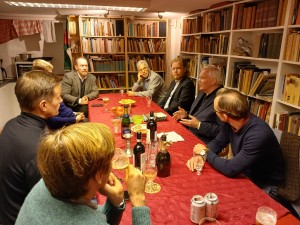RNH Academic Director, Hannes H. Gissurarson, Professor Emeritus in Politics at the University of Iceland, held a seminar with some conservative students in Oslo 14 November 2024 where he presented his new book, Conservative Liberalism, North and South: Grundtvig, Einaudi, and their Relevance Today. He emphasised the part of Snorri Sturluson and his account of the struggle in Norway between the sdefenders of the good, old law, a common heritage similar to language, and the kings who craved the power to legislate. The Nordic political tradition was remarkable, Gissurarson said. He pointed out that a Nordic model of international relations would consist in: 1) The right of secession, used by Norway in 1905, Finland in 1917, and Iceland in 1918. 2) Border changes by plebiscites, as done in Schleswig in 1920. 3) Autonomy of nationalities, on the Aaland Islands, the Faroe Islands, and Greenland. 4) The resolution of conflicts by arbitration, between Sweden and Finland on the Aaland Islands and between Denmark and Norway on Eastern Greenland. 5) Cooperation with a minimal loss of sovereignty, as in the Nordic Council.
 Gissurarson submitted that the cooperation of the Nordic countries in the Nordic Council should be the model for the European Union rather than the United States of America, a country united by a common language and a common political heritage and therefore much more homogeneous than the countries of Europe. He recalled that Einaudi had often been regarded as one of the fathers of the European Union. It was in the spirit of Einaudi that some reforms of the EU might be possible, such as to split the Court of Justice of the EU into a Subsidiarity Court dealing only with the competence between member states and the Union and a Court continuing to perform other tasks assigned to the Court of Justice. The Subsidiarity Principle which could be traced back to St. Thomas Aquinas was that decisions should be made as close to those whom they would affected as possible. It would also be sensible to transfer legislative power from the European Commission to the European Parliament and to split the Parliament into two chambers where one would be the present European Council and the other one would be elected in general elections in Europe. The European Commission should become an ordinary civil service.
Gissurarson submitted that the cooperation of the Nordic countries in the Nordic Council should be the model for the European Union rather than the United States of America, a country united by a common language and a common political heritage and therefore much more homogeneous than the countries of Europe. He recalled that Einaudi had often been regarded as one of the fathers of the European Union. It was in the spirit of Einaudi that some reforms of the EU might be possible, such as to split the Court of Justice of the EU into a Subsidiarity Court dealing only with the competence between member states and the Union and a Court continuing to perform other tasks assigned to the Court of Justice. The Subsidiarity Principle which could be traced back to St. Thomas Aquinas was that decisions should be made as close to those whom they would affected as possible. It would also be sensible to transfer legislative power from the European Commission to the European Parliament and to split the Parliament into two chambers where one would be the present European Council and the other one would be elected in general elections in Europe. The European Commission should become an ordinary civil service.


